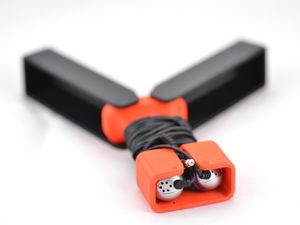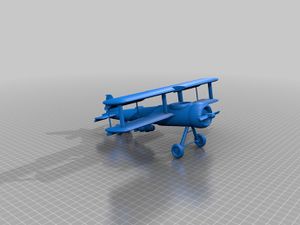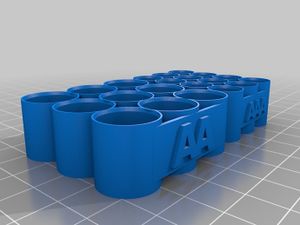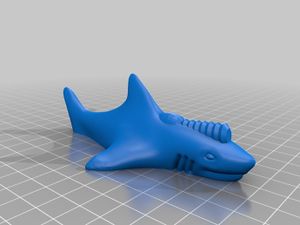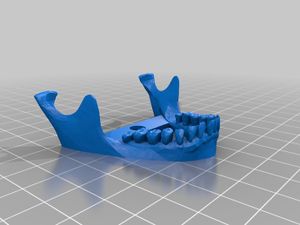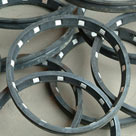User:MarkKeller22
Contents
Introduction
My name is Mark Keller and I am in my eighth semester at The Pennsylvania State University. I am majoring in Civil Engineering with a specialization in Water Resource Management. I intend on graduating in May 2013.
BLOGS
Weekly blogs will be written based on prompts provided by the professor. These blogs are typically related RepRap in one way or another but not always directly.
Blog Number One
Part A
An item that is useful
In today's society headphones are almost a necessity. Whether it is for iPods, iPhones, MP3 players, or for use with your personal computer, they have become an everyday item. The problem with headphones, is that they are difficult to carry when not in use. They get tangled and can even become knotted. These ear bud holders eliminate the mess associated with shoving ear buds into your pocket or book bag. The STL file can be downloaded here.
An item that is artistic/beautiful
Beauty is in the eye of the beholder, and I have always had a fascination with airplanes. The bi-plane really is a thing of beauty. Two wings, a sleek design, and the way it is able to maneuver through the air all contribute to its beauty. The STL file can be downloaded here.
An item that is pointless/useless
An item that is funny/weird
The "shark with a fricken laser" is from the Austin Powers movies. As a kid, and even still today I watch those movies and laugh. The scenes with Dr. Evil talking about sharks with lasers is always a classic and makes me laugh every time. It is funny to see that somebody took the time to draw one that can be rapid prototyped. The STL file can be downloaded here.
An item that is scary/strange
Although I can see some purpose for printing such an object, I feel that a lower jaw bone is a rather strange object to print. Typically if it were being used for medical purposes it would either be molded or an actual bone would be used, but to print one using a 3D printer for "personal use" just seems strange to me. The STL file can be downloaded here.
Part B
I do feel that I am a tinkerer. I love to take things apart and see how they work and then try to put them back together. I do feel that the amount of tinkering I do is decreasing as I get older. I do not have the same amount of free time to tinker as I did when I was younger, and my job does not require any tinkering. But when given the chance I thoroughly enjoy tinkering. My dad and my uncle's are all tinker. They grew up on a farm and had to fix things when they broke. Not only did they fix things, but they improved the equitment that they had, all through tinkering.
I agree with the argument. I particularly like the statement, "It’s that the notion that we can fix any problem or achieve any goal that we set for ourselves has deteriorated into a sanitized, corporatized version of what constitutes achievement." This directly relates to the fact that Americans have taken the replace it rather than fix it attitude. It is easier to just go out and replace something rather than fix what they have. This is the influence that corporate America has instilled upon us. The more we buy the more profit they make.
Things evolve through tinkering. No mater what field we are talking about, it is tinkering that pushes the progress. New things are created and old ideas are improved. So preserving the habitat, or allowing tinkering to continue to prosper will help us to "catch up" to where we should be.
The primary design principles that are the use of multidisciplinary brainstorming, finding out what do humans really want, and going beyond what you think you can do. It was pretty neat to see that someone who is as smart as Kelly and has created as many things as he has, is working on building a 3D printer, the same project that we are undertaking. I think that all of the principles can be applied to our work. We all think differently and using the minds of multiple individuals to complete a task helps it move that much quicker. Going beyond what you think you can do applies here as well. We may not all be programmers or good at physically building things, but we are all capable of doing it. This project will have us working on issues that we know nothing about, but we will, with struggle and time, be able to complete the tasks.
Blog Number Two
Mother Of All Demos:
When I first saw the mouse cursor move, it took me back to when I was younger. We had an old Macintosh computer I believe it was a mid to late 90s model, one of the grey boxes. That is what it looked like a grey box. We would fire it up and when moving the mouse, it had a similar lag to it like the one shown in the Douglas Engelbart video, Mother Of All Demos. It would have a string of pointers following as you moved the mouse until you would stop at a specific point. The program that Englebart was running sort of reminded me of Microsoft Word. Creating new files is similar to creating new documents. Each file can be saved and reopened at a later date. It can even open multiple files at one time. The copy and past functions are features that we use in every day life on computers. Sitting here in today's world, I take for granted all of the things that Englebart is demonstrating. I am incredibly impressed with technology that he is demonstrating. It is incredible to see how innovative people are and the technological feats that they have accomplished. At the time I don't believe that I would have been able to recognize the importance of what was being demonstrated. At that point, I don't think many people were doing work on computers so it might have been hard for everyone to visualize the importance, but had I been in the audience I would have recognized that copy and past is a useful feature as well as being able to save files.
Professor Richard Doyle: Open Source Futures
